Using Parent Helpers in Youth Football

Having parents help out with youth football practices and games can be a blessing and a curse. On the one hand there are times when more bodies can help – holding bags, running drills, serving on chain gang, etc. On the other hand, as a coach you need to manage all interactions with the players in your tam, and you are ultimately responsible for how these parents behave.
Some examples of how things can go sideways (I speak from experience):
- A parent who is only supposed to hold a bag during a form tackling drill starts giving instruction to players on technique, and his guidance runs counter to your teaching approach and borders on unsafe for the player.
- A parent serving on your chain gang starts chirping at officials about calls, and several of your players on the sideline start joining in.
- A parent is helping track play counts on the sideline during the game. Whenever his son comes out of the game for a breather, he goes straight to dad who chats with him about suggestions for what to fix the next time he goes in.
One way to deal with the issues is to avoid it all together and not have any parent help during practices or games. This is hard to do for most youth football coaches because they usually have a sincere need for this sort of help. Let’s break this down into two categories: practice help, and sideline help. There are some common tips for the two types, but each has its own flavor and demands so I’ll go into each separately.
Guidelines for All Parent Helpers
If you are going to enlist the help of parents, you must start the relationship off with clear expectations and boundaries. Don’t shy away from being very firm, and consider giving examples of acceptable vs. unacceptable behavior. Talk through how you will communicate and deal with infractions. For example, if a problem happens you might have a 1:1 conversation first, followed by a firm warning, finally resulting in removal if the behavior considers. This is a great topic to discuss during a parent meeting at the start of the season.
Guidelines for Practice Helpers
This is where you need to draw a firm line between coaching and helping. Let’s go back to the example of running a form tackling drill with a dummy, and you are using a parent helper to hold the bag. Perhaps you are using the heads up tackling guidelines to teach, or perhaps you are using Seahawks tacking. Either way, you likely have very specific coaching points to convey, and you and your assistants have taken the time to learn how to teach proper technique.
Odds are your helper has not. And, to make matters worse, he may have played some football in his day and is eager to convey all the great wisdom his high school coach shared with him 30 years ago.
You cannot allow this! Only coaches should be coaching, and firm boundaries must be in place for helpers. This doesn’t mean the helpers can’t interact with the kids, but they shouldn’t be coaching. Have the helper give a word of encouragement on each rep, or be responsible for keeping the drill moving quickly to maximize repetitions.
Sideline Helpers
I think this is the hardest to manage because of the chaos present on most football sidelines. If you are a head coach, it can be hard enough to manage your assistant coaches and players. There are two things to look out for and avoid with your sideline helpers:
- Interacting with the officials or the other team’s players. Only the head coach should be interacting with the officials.
- Interacting with your players. You might find in some cases this is acceptable. One season we had a parent who had some first aid and athletic training background, and we found it very helpful to have him deal with player injuries. Obviously it is perfectly acceptable for this helper to talk with kids as he is mending them up. On the other hand, you don’t want any helpers giving coaching or game feedback to players. It will almost certainly conflict with your coaching guidance and only serve to confuse the players.
As I mentioned earlier in this article, setting expectations up front is the most important first step. But you must be quick and deliberate in your follow-through when these expectations are not met. We’ve had to “fire” sideline helpers on multiple occasions. Two seasons ago we fired our entire chain gang after repeat offenses, and for our final home game we recruited four former players to come and serve. This was extreme but necessary.
One final note: I think the need for parent helpers diminishes as you coach teams with older players. The roles you would normally assign to parent helpers during practice can often be fulfilled by players themselves as they get bigger and more capable.